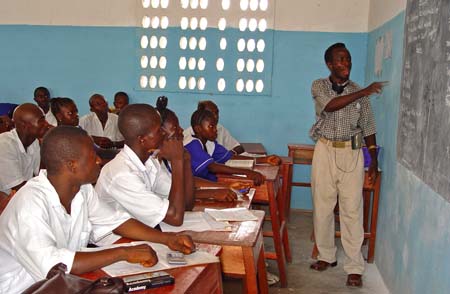
Teacher
A teacher, also called a schoolteacher or formally an educator, is a person who helps students to acquire knowledge, competence, or virtue, via the practice of teaching.
"Educators" redirects here. For the TV series, see Educators (TV series).Occupation
Informally the role of teacher may be taken on by anyone (e.g. when showing a colleague how to perform a specific task).
In some countries, teaching young people of school age may be carried out in an informal setting, such as within the family (homeschooling), rather than in a formal setting such as a school or college.
Some other professions may involve a significant amount of teaching (e.g. youth worker, pastor).
In most countries, formal teaching of students is usually carried out by paid professional teachers. This article focuses on those who are employed, as their main role, to teach others in a formal education context, such as at a school or other place of initial formal education or training.
Duties and functions
A teacher's role may vary among cultures.
Teachers may provide instruction in literacy and numeracy, craftsmanship or vocational training, the arts, religion, civics, community roles, or life skills.
Formal teaching tasks include preparing lessons according to agreed curricula, giving lessons, and assessing pupil progress.
A teacher's professional duties may extend beyond formal teaching. Outside of the classroom teachers may accompany students on field trips, supervise study halls, help with the organization of school functions, and serve as supervisors for extracurricular activities. They also have the legal duty to protect students from harm,[2] such as that which may result from bullying,[3] sexual harassment, racism or abuse.[4]
In some education systems, teachers may be responsible for student discipline.
Occupational hazards
Teachers face several occupational hazards in their line of work, including occupational stress, which can negatively impact teachers' mental and physical health, productivity, and students' performance. Stress can be caused by organizational change, relationships with students, fellow teachers, and administrative personnel, working environment, expectations to substitute, long hours with a heavy workload, and inspections. Teachers are also at high risk for occupational burnout.[44]
A 2000 study found that 42% of UK teachers experienced occupational stress, twice the figure for the average profession. A 2012 study found that teachers experienced double the rate of anxiety, depression, and stress than average workers.[44]
There are several ways to mitigate the occupational hazards of teaching. Organizational interventions, like changing teachers' schedules, providing support networks and mentoring, changing the work environment, and offering promotions and bonuses, may be effective in helping to reduce occupational stress among teachers. Individual-level interventions, including stress-management training and counseling, are also used to relieve occupational stress among teachers.[44]
Apart from this, teachers are often not given sufficient opportunities for professional growth or promotions. This leads to some stagnancy, as there is not sufficient interests to enter the profession. An organisation in India called Centre for Teacher Accreditation (CENTA) is working to reduce this hazard, by trying to open opportunities for teachers in India.
Assistant teachers
Assistant teachers are additional teachers assisting the primary teacher, often in the same classroom. There are different types around the world, as well as a variety of formal programs defining roles and responsibilities.
One type is a Foreign Language Assistant, which in Germany is run by the Educational Exchange Service (Pädagogischer Austauschdienst).
British schools employ teaching assistants, who are not considered fully qualified teachers, and as such, are guided by teachers but may supervise and teach groups of pupils independently. In the United Kingdom, the term "assistant teacher" used to be used to refer to any qualified or unqualified teacher who was not a head or deputy head teacher.
The Japanese education system employs Assistant Language Teachers in elementary, junior high and high schools.
Learning by teaching (German short form: LdL) is a method which allows pupils and students to prepare and teach lessons or parts of lessons, with the understanding that a student's own learning is enhanced through the teaching process.